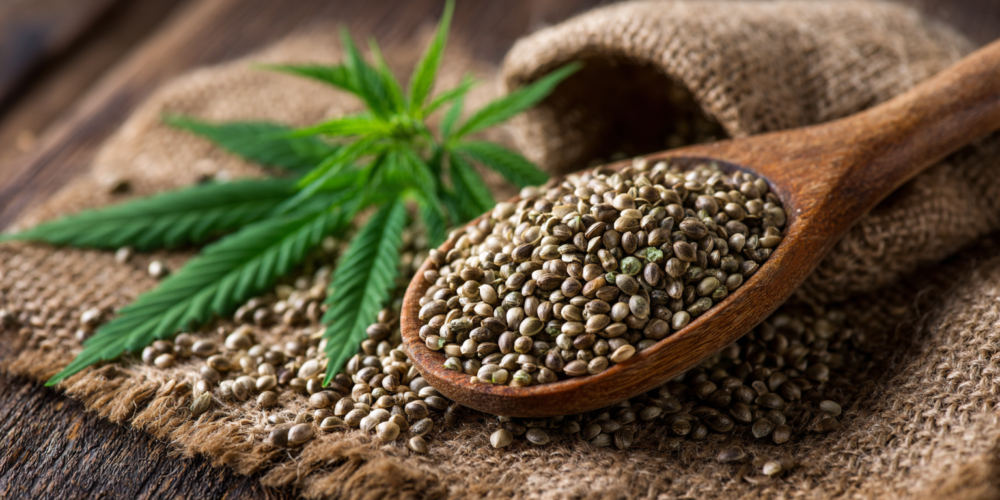
Get ready for a seed-tastic adventure! Today, we’re uncovering the amazing power hidden within those tiny treasures you probably already have in your pantry. Think of them as a supergroup of seeds, each with its own unique story and incredible benefits, especially for your nerves. We’re talking about the “Fab Four”: Chia, Hemp, Flax, and Pumpkin seeds. These aren’t just food; they’re like little nutritional superheroes ready to boost your health and help repair your nerves. So, settle in and let’s explore how these four powerhouses can nourish and heal you. (This article draws on the expertise of Dr. Valarie Monteiro.)
The Ancient Origins and Modern Appeal Of Seeds

These seeds have a history that stretches back centuries, powering ancient civilizations and playing important roles in different cultures. From the Aztec and Mayan warriors who relied on chia seeds for energy, to the Egyptians using hemp for ropes and clothing, and the Babylonians cultivating flax for food and textiles, these seeds have always been valued. Even pumpkin seeds, often overlooked, have a rich history. It’s amazing how these small items have sustained people for so long and are now making a big comeback in modern health trends.
4. Chia Seeds: The Tiny Powerhouse

Chia seeds, originating from ancient Aztec and Mayan cultures, were once a staple food that fueled warriors and sustained communities. They were so highly valued that they were used in religious ceremonies and even as currency! Despite their small size, chia seeds pack a serious nutritional punch. They are loaded with protein, fiber, antioxidants, minerals, and those all-important omega-3 fatty acids.
Key Takeaways for Chia Seeds:
- Fiber Rich: A serving provides a significant amount of soluble fiber, which is great for your gut bacteria and helps reduce inflammation.
- Complete Protein: Contains all nine essential amino acids, vital for cell function.
- Calcium Boost: Offers more calcium than milk, supporting bone health.
- Omega-3 Source: Provides plant-based omega-3s, important for brain and nerve health.
- Mineral Abundance: Rich in manganese, phosphorus, copper, selenium, iron, and magnesium, all crucial for various bodily functions, including nerve health.
- Antioxidant Power: Contains antioxidants like quercetin, which aids nerve cell communication and regeneration.
Chia seeds are particularly noted for their high fiber content, with about two tablespoons offering 11 grams of soluble fiber. This type of fiber acts as food for your probiotics, promoting gut health and reducing inflammation. They also boast a higher protein content than most plants, providing all nine essential amino acids, making them a complete protein source. This is important because your body can’t make these amino acids on its own. Just a couple of tablespoons give you 5 grams of protein.
Surprisingly, chia seeds contain more calcium than milk. Two ounces of chia seeds provide 360 mg of calcium, while 8 ounces of milk offer 300 mg. They are also an excellent plant-based source of omega-3 fatty acids, even more so than flax seeds. Omega-3s are critical for maintaining the health of your nerve cell membranes and facilitating communication between neurons. They might even help prevent neurodegenerative disorders. However, it’s worth noting that the omega-3s in chia seeds (ALA) aren’t as potent as the EPA and DHA found in fish oil, which your body can use more directly.
Chia seeds are also packed with minerals like manganese (for metabolism and development), phosphorus (for bone health), copper (important for heart health and nerve function), selenium (an antioxidant that protects nerve cells), iron (for oxygen transport to nerves), and magnesium. Magnesium is particularly important for nerve function, blood sugar, and blood pressure. Many people are deficient in magnesium, and low levels can affect other minerals like calcium and potassium. One ounce of chia seeds provides 95 mg of magnesium.
Calcium, the most abundant mineral in your body, is not only for bones but also essential for nerve signal transmission and reducing nerve inflammation. The antioxidants in chia seeds, like quercetin, help protect your nerves from damage caused by free radicals. These antioxidants also protect the omega-3 fats in the seeds, extending their shelf life. Quercetin, in particular, is known to improve nerve cell communication and promote nerve regeneration, and it even supports the immune system.
3. Hemp Seeds: The Complete Protein Champion

Hemp seeds, often misunderstood, have been recognized for their versatility and nutritional value since ancient times. The Chinese used them as a food source as early as 2800 BCE, and the ancient Egyptians valued them for making ropes, sails, and clothing. Hemp seeds have a mild, nutty flavor and offer a significant nutritional boost.
Key Takeaways for Hemp Seeds:
- Superior Protein: Contain nearly double the protein of chia seeds and are a complete protein source.
- Mineral Rich: Provide copper, manganese, magnesium, phosphorus, calcium, iron, and zinc.
- Zinc’s Role: Zinc is vital for brain health, promoting antioxidant effects and new nerve growth.
- B Vitamins: Offer a good range of B vitamins (B1, B2, B3, B5, B6), which are important for metabolism and nerve function.
Hemp seeds are an excellent source of plant-based protein, even surpassing chia seeds. One ounce of hemp seeds contains 9.5 grams of complete protein, compared to chia seeds’ 5 grams. Research suggests hemp protein is well-absorbed by the body. While hemp seeds don’t have as much fiber as chia seeds (1 gram per ounce), they deliver a powerful array of minerals, including copper, manganese, magnesium, phosphorus, calcium, iron, and zinc. Zinc is especially important for brain health, supporting antioxidant effects and neurogenesis (new nerve growth) in both the peripheral and central nervous systems. It also plays a key role in immune function and healing.
Hemp seeds also stand out for their B vitamin content, offering B1, B2, B3, B5, and B6, which are crucial for metabolism and maintaining healthy nerve function. While chia seeds offer some minerals and omega-3s, hemp seeds shine with their higher protein content and B vitamins, making them a strong contender in the seed superfood category.

